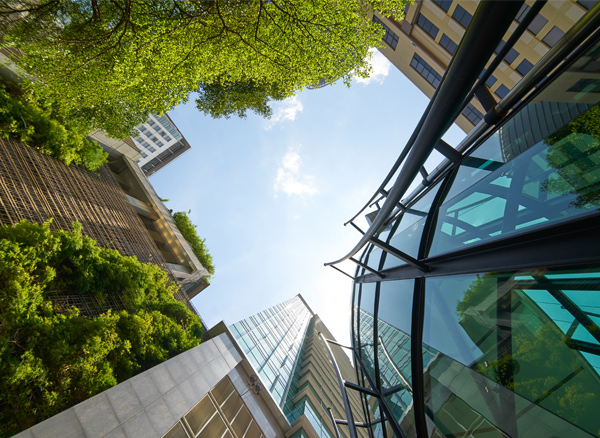

How are hotels embracing environmental solutions for sustainable stays?
Sustainability is on the agenda for many companies in their quest to make a positive change to the environment in the regions in which they travel and operate. In fact, the 2023 Corporate Travel Management (CTM) Global Customer Survey indicated that Australian and New Zealand (AU/NZ) customers have shown a 15.15% increase in their focus on sustainability for their travel programs in 2023 compared to the previous year, 2022.
With customers increasing their focus on sustainability, CTM is committed to providing innovative travel solutions that support our customers in achieving their goals and also aligning their travel program with preferred suppliers that share their commitment and provide travel tools that guide both travellers and travel bookers to make more informed sustainable choices.
Travel suppliers have a part to play towards a sustainable future and hoteliers are stepping up to the plate. Hotel chains across AU/NZ have prioritised integrating sustainability solutions into their operations to include efficiency standards in the energy, waste, and water management, but some have gone much further in their efforts to reduce their overall impact on the environment.
Learn how some of CTM’s hotel suppliers across AU/NZ are proactively integrating sustainable solutions into their operations. This initiative not only supports their own sustainability goals but also complements the broader objectives of fostering a greener and more eco-conscious travel industry.

Innovative solutions to food wastage
IHG Hotels and Resorts
IHG Hotels and Resorts has 95+ properties across Australasia and the Pacific, featuring brands such as InterContinental, voco, Crowne Plaza, and Holiday Inn brands. Their 10-year responsible business plan, ‘Journey to Tomorrow’, launched in 2021, prioritises a positive impact on people, local communities, and the environment.
In the last 12 months, IHG has actively pursued sustainability initiatives aligned with this business plan. They’ve partnered with OzHarvest and KiwiHarvest since 2019, engaging in food donations, fundraising, and supporting educational programs like Nourish. IHG launched a Food Waste Reduction eLearning program for food and beverage leaders and colleagues, focusing on reducing single-use plastic. They introduced a single-use item toolkit and dry amenities offering to replace non-sustainable items throughout the guest journey. They have also introduced Australia’s first carbon-neutral hotel, the Holiday Inn Express Newcastle. Other initiatives include recycled bedding, solar farms, local produce sourcing, beehives, and coral propagation programs.
Accor
Serving over 150 million meals per year globally, Accor is focused on providing healthy and sustainable meals while reducing food waste. To achieve this, their hotels apply creative approaches to repurposing unconsumed food items. The Pullman Auckland turns orange peels from breakfast into marmalade, and The MGallery Hotel St-Moritz de Queenstown transforms leftover milk into cheese. Accor has also established 1,200+ urban vegetable gardens across its hotels for consumable produce.
Reduction of carbon emissions via eco-friendly initiatives and building design
Sudima Hotels
At Sudima Hotels, environmental sustainability is a key component of their ESG strategy, reflecting their mission to provide the most accessible and environmentally sustainable hotels in Australasia. They are dedicated to Kaitiaki guardianship of New Zealand’s environment, focusing on carbon emissions and education and measurement.
Sudima Hotels has recently introduced various eco-friendly initiatives across its seven properties. For example, Sudima Queenstown Five Mile has taken steps to reduce waste, such as minimising kitchen bins and composting organic waste locally. Additionally, the hotel has eliminated the use of cling wrap and is actively exploring ways to improve its supply chain.
Sunset in Sudima Auckland City is the brand’s first hotel to feature a fully inducted kitchen without a gas supply and uses low GWP refrigerants. Sudima Auckland Airport installed a 125kW solar panel system on its roof in December 2022, which has been effectively supplying power since.
Sudima Hotels selectively partners with like-minded suppliers and encourages key consumable suppliers to sign their responsible procurement pledge, working collaboratively to eliminate waste. In October 2022, Sudima Hotels became the first hotel group to partner with Bank of New Zealand (BNZ) on a sustainability-linked loan (SLL).
Accor
Accor strongly upholds sustainable value creation, promoting ‘positive hospitality’ by contributing to the planet and the community. Balancing comfort with environmental improvements, Accor has set ambitious goals, aiming for a 46% reduction in carbon emissions by 2023. Their efforts are concentrated on two main areas: building design and food reduction.
Accor is dedicated to ensuring 100% of renovated or new hotels are low-carbon buildings. They employ various strategies, including monthly analysis of water and energy consumption, standard water flow compliance, wastewater treatment, energy-saving lamps, and recycling. In 2022, they successfully eliminated 80% of single-use plastics from their guest experience.
For example, at The Pullman Sydney Olympic Park, solar thermal collectors provide highly efficient water heating, while the Novotel-ibis Sydney Olympic Park combo uses solar panels for water heating and photovoltaic panels for electricity generation.
Looking ahead, Accor continues to implement initiatives to achieve its long-term sustainability strategy, including a target to reduce carbon emissions by 25% by 2025.

TFE Hotels
TFE Hotels is on an ESG journey that, in recent years, has seen the Australian-based group roll out a ‘Global People, Local Conscious’ social impact charter; develop a GHG emissions tool and carbon management plan; and roll out a range of environmentally friendly initiatives and hotels across the global network.
Part of the Collection by TFE Hotels brand, The Hotel Britomart in Auckland, set clean and green precedents in the development space as New Zealand’s first 5 Green Star hotel. This certification applies to almost every decision made during construction, but there are a few key aspects that make the development of a Green Star building unique. One of them is the recycling or reuse of construction waste; the industry benchmark for which is 70% of construction waste to be re-used or recycled, a target which The Hotel Britomart has surpassed with a result of over 90%. Another is that the hotel’s operational greenhouse gas emissions are projected to be 50% lower than a building that meets the minimum requirements of the New Zealand Building Code.
Across the Tasman, the Adina Apartment Hotel Melbourne Southbank also demonstrates how clean and green construction technology forms a big part of the solution to a more sustainable world. The first Cross Laminated Timber (CLT) hotel tower of its kind in Australia, the hotel utilises 5,300 tonnes of Cross Laminated Timber (just a fifth of the weight of concrete). This infrastructure directly offsets about 4,200 tonnes of carbon dioxide from the atmosphere, while also side-stepping greenhouse gas emissions involved in demolition.
EVT
Driven by their Elevate strategy, EVT pledge to make local change happen by implementing ongoing sustainable practices across their group. Sustainability is integrated into EVT’s new properties through thoughtful design and energy efficiency optimisation. EVT prioritises reducing carbon emissions and waste by adopting practices like recycling, waste management, eliminating single-use plastics, and using renewable energy where possible. EVT is also dedicated to transparent communication and reporting of their environmental impact, including carbon emissions and climate risk assessments.
An example of this is LyLo Auckland, which won the Best Hotel of the Year – Conversion award at the Australasia-Pacific Hotel Design Awards for its environmentally thoughtful design, including recycled building materials, amenities made from recycled products, EV charging stations, and water and power conservation initiatives.
Providing sustainable choices to enhance the guest experience
Crystalbrook Collection
Crystalbrook Collection places a strong emphasis on environmental protection and sustainable experiences that enhance the guest experience. Embracing environmental solutions and responsible luxury, they have implemented numerous options, enabling guests to ‘travel with a lighter footprint’.
Crystalbrook has introduced ‘Climate Calories’ across their restaurant and bar menus, allowing patrons to assess the environmental impact of their meals. Climate Calories provide visibility on whether the meal’s ingredients were locally sourced, sustainably sourced, culturally considered, used the whole ingredient, or came in eco-friendly packaging. The brand emphasises sourcing locally, with 80% of fresh produce obtained locally, and beef locally sourced from suppliers prioritising animal welfare.
Crystalbrook stands as the first hospitality group in Australia to accomplish 100% waste-free bathrooms, featuring biodegradable or recyclable amenities. In rooms, glass bottled water is provided, saving 375,000 plastic bottles from landfill annually. Composting has also been a significant waste reduction solution, with Subpods at Crystalbrook Byron Bay and Crystalbrook Flynn in Cairns diverting approximately 105kg of waste per day from landfill.
Through recycling, using biodegradable/ recycled products (like 100% wood key cards) and minimising waste, Crystalbrook demonstrates a strong ongoing commitment to sustainable hospitality.
In the journey towards a sustainable future, CTM’s key hoteliers are actively embracing their role, integrating an eco-friendly approach to building design, food and waste management and guest offerings across their operations. Businesses can significantly reduce their carbon footprint and achieve their targets by embracing solutions such as CTM’s sustainable travel management technology and aligning their travel programs with suppliers who actively demonstrate an ongoing commitment to sustainability through tangible initiatives and transparency.
Eager to find out more about how hotels are embracing environmental solutions?
Contact CTM to learn more about our sustainable travel solutions and technology today.




